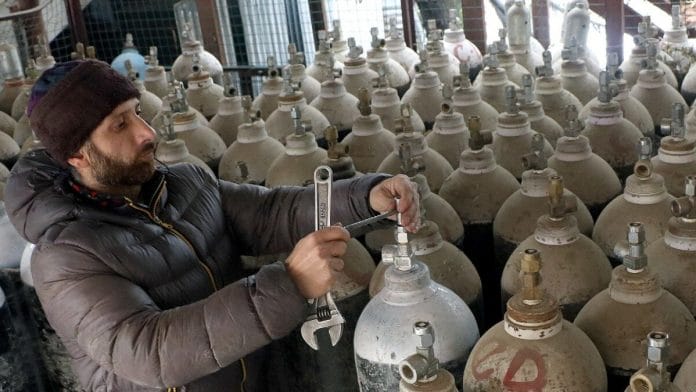New Delhi: At the peak of the second wave, the heat turned on the Government of India for its tardiness in setting up Pressure Swing Adsorption (PSA) oxygen plants as daily requirements broke all records.
One year on, there are 3,756 such plants already commissioned across the country with a daily capacity of 18,000 metric tonnes (MT), but demand remains low at about 200 MT. With the low demand raising questions about the human resources and other costs involved in running the plants, the central government is looking for ways to keep the plants operational — allowing them to lie idle could mean letting the plants become defunct over time.
After the issue was flagged by many hospitals, the Union Ministry of Health & Family Welfare has come up with a potential solution — it has asked hospitals with functioning PSA oxygen plants to start filling up cylinders and supplying oxygen to smaller establishments that need medical oxygen, such as hospitals and nursing homes.
A top source in the ministry told ThePrint: “These are white elephants. Hospitals have to pay for the power consumption and also employ the manpower required to operate these plants. But they have to be kept running otherwise they will become defunct. We have to keep them in readiness so that if there is once again a situation when oxygen demand shoots up, we are prepared.”
At the peak of the Delta wave in April 2021, the daily allocation of oxygen for Delhi alone was about 700 MT and there was continuous Centre-state bickering for more.
“Since the plants were set up only in big hospitals, we have now asked these hospitals to start filling up oxygen cylinders and supply them to smaller hospitals and nursing homes around them,” the source added. Ordinarily, oxygen produced in PSA plants is supplied onsite using pipelines.
In April 2021, the total daily production capacity of oxygen in the country was about 7,127 MT per day.
Also read: Connect, compete, earn: How Covid lockdowns set Indian gaming industry on path to $2 bn by 2023
Commissioned plants
On 25 March, replying to a question in the Lok Sabha, Minister of State for Health Bharati Pravin Pawar had said: “As of 21st March 2022, 3,756 PSA plants have been commissioned in the country. This includes PSA plants under PM-CARES, PSUs of various central ministries, and other sources to enhance the capacity of medical oxygen production and supply at the facility level.”
A PSA oxygen plant uses a technology that absorbs nitrogen to concentrate oxygen from the ambient air to supply it to hospitals. It operates at near-ambient temperatures and uses specific adsorbent materials like zeolites, activated carbon, and molecular sieves to trap oxygen at high pressure.
When demand is high, a PSA plant is more economical than cylinders. A plant that can supply 24 cylinders worth of gas per day costs about Rs 33 lakh and can be set up in a couple of weeks. A 240-bed hospital with 40 ICU beds uses oxygen worth about Rs 5 lakh per month during normal times.
(Edited By Uttara Ramaswamy)
Also read: DNA-based, needle-free Covid vaccine ZyCoV-D 67% effective in Phase 3 trial, Lancet study finds






